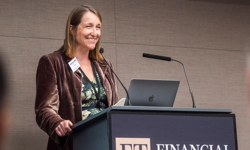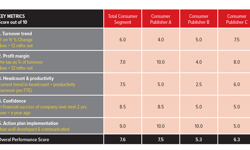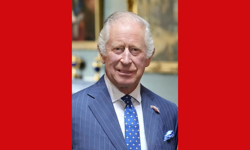
Happy birthday Sun
November saw The Sun celebrate 50 years as a Murdoch owned tabloid.
The paper ran a poll to find which of its famous front pages resonated most with its readers and the winner was its classic 1986 offering: ‘Freddie Starr ate my hamster’. Comedian Starr was said to have snacked on a live hamster in a sandwich, though he later denied it, although he did admit that it was “the greatest piece of publicity” he ever had.
Tony Gallagher, editor of The Sun, said: “The Sun is famous for serving up stunning front pages. We don’t just dish up the day’s news: we want to delight, amuse, surprise and inform, as well as grab people’s attention.”
Other front pages in the top ten were ‘Up yours Delors’ and ‘Zip me up before you go go’. Unsurprisingly absent was its infamous 19 April 1989 headline, ‘The Truth’, which did such lasting damage to its reputation, and sales, on Merseyside.
At the Society of Editors conference, Gallagher received a special award to recognise the good causes championed by The Sun over five decades.
In a recorded video message, Rupert Murdoch praised the paper’s readers for having helped raise more than £100 million: “I want to thank our millions of readers over the years. Without them, The Sun would not have been as positive a force at every step of the way.”
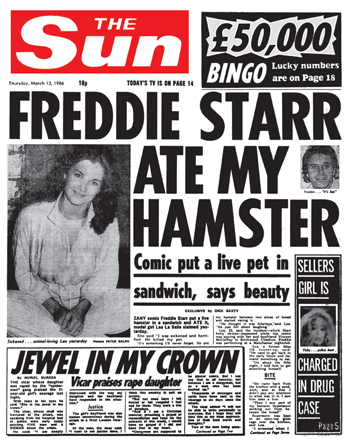
Management issues
In good times, senior management is usually too busy making money to worry about mission statements and re-organisations. In more challenging times, they are all the rage.
In early December, Vogue announced the launch of Vogue Values, a global mission statement adopted by all 26 editions of Vogue that articulates the titles' shared commitments.
The statement, signed by all the editors-in-chief, was worthy and laudable, but not terribly revealing: “… Vogue stands for thought-provoking imagery and intelligent storytelling. … We speak with a unified voice across 26 editions standing for the values of diversity, responsibility and respect for individuals, communities and for our natural environment.”
Mission statements are all very well, and it’s usually hard to find one you’d disagree with, but to what extent are they read, or even known about, outside the confines of the meeting room in which they are hatched?
However, Roger Lynch, CEO of Condé Nast, clearly thinks it’s worth the effort: “This new commitment underscores what we can accomplish when we work together to leverage our global reach.”
Meanwhile, Hearst has been busy on the restructuring front. In January, the company announced strategic changes to “better align” its four owned and operated markets (UK, Italy, Spain, Netherlands) to deliver a joined-up approach, under the banner, ‘One Hearst Europe’.
The changes have been implemented by James Wildman, president, Hearst Magazines Europe. This is the first step in restructuring the European business to transform it into a more collaborative, future-facing media company.
One Hearst Europe will operate through a cross-market structure that’s organised by function instead of country. Teams will continue to operate in their respective markets and manage separate country P&Ls with country managers leading efforts locally. However, there will be a move to four stronger and more collaborative European business divisions which will share best practice and drive partnership between markets.
The four divisions are: Central Operations, Content and Consumer (B2C), Marketing Solutions (B2B), People Team (Human Resources).
James Wildman: “By aligning our exceptional talent across our markets, we will become even more innovative and effective.”

Acquisitions
After a six-month hiatus, Mark Allen got back in the acquisitions saddle, with the purchase of Farmers Weekly from RBI, only to immediately get back out of it (the saddle that is, not the deal).
Mark Allen, founder and chairman of Mark Allen Group: “When I worked for RBI many years ago, Farmers Weekly was regarded as the very top of the publishing mountain both inside and outside the company. … It represents the summit of our acquisition strategy. In future, we will be looking to more organic growth, rather than acquisition, as our main focus.”
This signals a major strategic shift for a company that has grown hugely over the last decade on the back of acquisitions.
Karl Schneider, publishing director and editor-in-chief of Farmers Weekly: “RBI has been a good home for Farmers Weekly, but it’s great to be joining a company completely focused on and passionate about publishing and events.”
Other recent acquisitions include Anthem purchasing Planet Mindful from TI Media, and DMGT buying the i newspaper from jpimedia.
Lord Rothermere, chairman of DMGT: “It is a highly respected publication with a loyal and engaged readership. We are committed to preserving its distinctive, high quality and politically independent editorial style… Financially, the ‘i’ will be a strong cash generator for the Group as we continue to invest across the portfolio, both organically and through acquisitions.”
And, how nice it is to hear a newspaper, any newspaper, described as a “strong cash generator”.
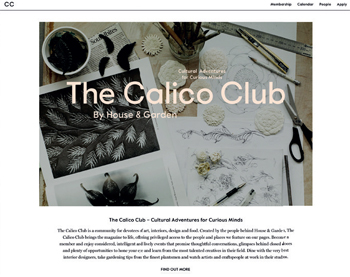
Launches
Membership models are becoming increasingly popular. In December, House & Garden announced the launch of The Calico Club, a new community for devotees of art, interiors, gardens, design and food.
The Calico Club aims to bring House & Garden to life by offering privileged, exclusive access to the people and places featured in its pages, says Condé Nast.
Members will have access to a calendar of events, complimentary tickets to art and design fairs, a monthly newsletter outlining the latest goings-on in the world of art, architecture, design, interiors, gardens and food, and an annual subscription to House & Garden magazine.
Editor-in-Chief of House & Garden, Hatta Byng: “I am thrilled to be bringing House & Garden to life through our new venture, The Calico Club. It gives our readers unprecedented access to the interiors world, allowing them to hone their eye and learn from the most talented creatives in their field.”
Elsewhere, the Telegraph has launched a new digital recipe channel. Cookbook is home to more than 3000 recipes, and each week around 25 new recipes will be added to the site, promise the publishers.
Cookbook’s recipes are curated under a range of themes including ‘Cook with Diana’, promising the “very best from Diana Henry’s kitchen”, and ‘What to cook now’ – the editor’s pick of dishes to make this week. There are also dedicated collections that look ahead to the weekend, with ‘Saturday Supper Club’ and ‘Make it this weekend’. Ideas for quick and easy, vegetarian, and baking recipes are all given a dedicated position on the Cookbook homepage.
Accompanying the new site is the now obligatory weekly newsletter.
Amy Bryant, food editor, The Telegraph: “From quick midweek meals to the ultimate festive feast, Cookbook features culinary creations from our much-loved cookery writers and chefs.”
Climate action
In November, Condé Nast became the first media company to sign the UN’s Fashion Industry Charter for Climate Action and to make packaging pledges as part of the Ellen MacArthur Foundation’s New Plastics Economy Global Commitment.
Through these partnerships, new initiatives and clear targets of accountability, the company says it aims to drive higher standards and systemic change in addressing climate change.
In addition to these partnerships, Condé Nast says it will use its brands to influence climate action through its own operations and the fashion and media industries.
“Condé Nast is home to some of the most influential, iconic brands in the world. We have a responsibility to use the power of those brands to help raise awareness, define terms of change, and point to solutions to ensure our audiences and our industry are informed and engaged in taking climate action,” said Roger Lynch. “We also have a responsibility to operate our business in the most sustainable way possible. We are committed to measuring and reporting on our progress as we strive to be better global citizens.”
Elsewhere, in line with its sustainability targets, Haymarket has begun to eradicate plastic mailing film from its supply chain.
The ENDS Report has mailed without any wrap since 2018, and their first paper-wrapped title mailed in July 2019. A further seven titles have mailed without any wrap or using paper during 2019.
A review of their titles that continue to use plastic is underway, acknowledging the difficulties of schedules, formats and logistics, says the company.
Haymarket's head of production operations, Trevor Simpson: “We are very pleased to see this project gather momentum. It has taken considerable time and effort to get here.”
Also on the wrapping front, Immediate Media announced that the majority of its monthly subscription titles will be posted in paper wrap from January 2020.
This will result in a reduction of more than 7.7 million pieces of plastic, equating to a saving of around 43.3 tonnes of plastic a year, says the company.
From December, many of Immediate’s Bristol produced titles, including BBC History, BBC Science Focus, Gardens Illustrated and Cycling Plus, will switch from recyclable polywrap to paperwrap. In January, Immediate’s craft portfolio, including Mollie Makes, and food portfolio, including BBC Good Food, will also move to paperwrap.
Andy Marshall, Immediate managing director with responsibility for sustainability: “The move to paperwrap for our monthly titles is an important part of Immediate’s strategy to adopt more sustainable practices across our whole business.”
Project Neon
In November, Archant unveiled Peterborough as the first community to benefit from a new experimental approach to local digital news and information.
This is part of Archant’s Project Neon collaboration with the Google News Initiative’s Local News Experiments project.
PeterboroughMatters.co.uk will launch in Spring 2020 as part of the publisher’s bid to develop a new and sustainable commercial model for local news in the UK.
“Local journalism’s survival is so crucial, yet today its long-term future is under threat because nobody has yet cracked the challenge of making it profitable in a digital-only world,” said Matt Kelly, Archant’s chief content officer. “Like so many other communities in the UK, Peterborough has seen provision of local journalism shrink significantly over the years.”
“Project Neon is all about experimenting with different models of journalism and business to create a sustainable business based on high quality, useful community content, and challenging some received wisdoms as we do it. What we learn, we will share openly with the industry and in doing so we hope to play a part in ensuring local news once again thrives.”
According to Archant, Peterborough Matters will not seek to compete with existing traditional local titles, but instead try to build significantly higher levels of daily engagement with users through an innovative blend of community-driven content, useful information and local advertising.
This article was first published in InPublishing magazine. If you would like to be added to the free mailing list, please register here.


